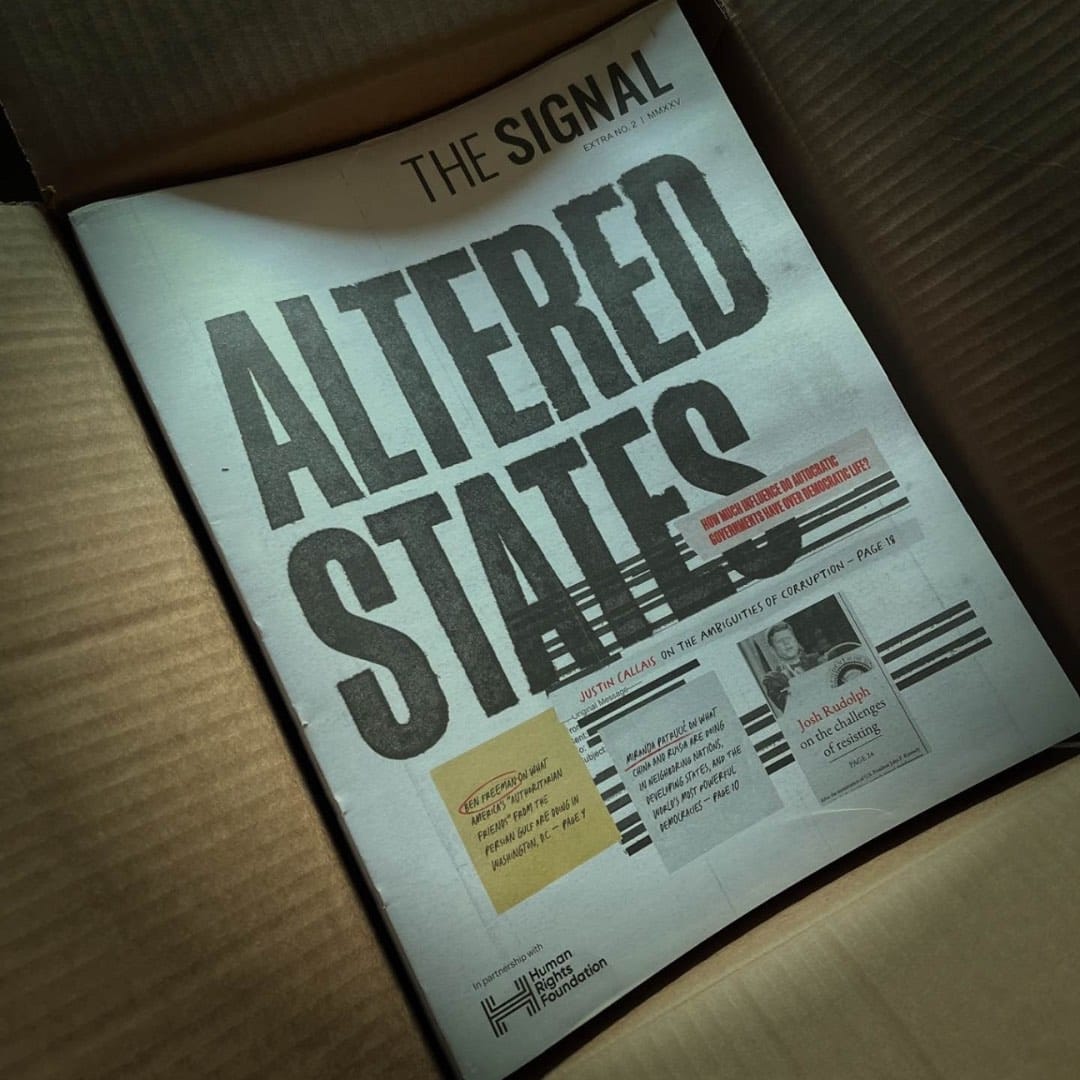‘Many things’ in the Caribbean

Recently: The weekend despatch: Is there a pattern in Trump’s framework deals? What do AI models see forming in the South China Sea? + Is disco … undead?
Today: U.S. forces have killed 65 people in the Caribbean and Pacific since September and are now sending a carrier strike group to Venezuelan waters. President Donald Trump now says regime change is the objective. In which case, what will the means be?
+ For members: Why are so many foreign powers involving themselves in Africa’s deadliest civil war? Alex de Waal on the plunder of Sudan.
& New music from Clark ...
The carrier and the question
When asked in a CBS interview on Sunday whether Venezuelan leader Nicolás Maduro’s days as president are numbered, U.S. President Donald Trump replied: “I would say yeah. I think so, yeah.” It’s the first time the American president has stated regime change as the goal—not counternarcotics, not counterterrorism, but removing Maduro from power.
Since early September, American forces have killed at least 65 people in strikes on vessels the United States claims were smuggling narcotics. The administration has produced no evidence. Some 10,000 troops now operate in the Caribbean alongside eight warships, including a submarine with Tomahawk missiles, F-35s in Puerto Rico, and bomber demonstrations along Venezuela’s coast. The USS Gerald R. Ford carrier strike group is en route. Secretary of State Marco Rubio calls this counterterrorism. The force composition has suggested otherwise.
Asked whether the operation was about stopping drugs or removing Maduro, Trump said, “Many things.” Asked about land strikes, he wouldn’t rule them out. His first-term sanctions failed to remove Maduro—and triggered the largest migration exodus in the history of the Western Hemisphere. Maduro has meanwhile declared emergency rule, militarized 20 of 23 states, and positioned Russian air defenses at ports—evidently preparing for invasion regardless of how serious Trump is about numbering his days.

Meanwhile
- Forty-two million Americans, half their food aid. The Trump administration said on Monday it will provide half of November’s food benefits to 42 million low-income Americans after federal judges ruled halting payments during the government shutdown was unlawful. The Supplemental Nutrition Assistance Program—SNAP, commonly known as food stamps—provides about $187 monthly per person. Benefits stopped on November 1 as the shutdown entered its 34th day. U.S. Treasury Secretary Scott Bessent said partial payments might arrive on Wednesday, though state systems may take weeks to process them.
- The general who leaked an assault video. Israel’s military arrested Major General Yifat Tomer-Yerushalmi on Monday, hours after the former top lawyer for the Israeli Defense Forces went missing on Sunday. The arrest follows her resignation on Friday over leaking surveillance video showing soldiers severely abusing a Palestinian prisoner at the Sde Teiman detention facility in southern Israel. Five soldiers seen in the video face prosecution. Finance Minister Bezalel Smotrich has said they should be treated like “heroes, not villains,” while Former Prime Minister Ehud Olmert warned the political defense of the soldiers represents “the biggest danger facing Israel.”
- An earthquake in Afghanistan. A 6.3-magnitude quake near Mazar-i-Sharif early Monday killed at least 20 people, injuring more than 640. It also damaged the city’s historic Blue Mosque and destroyed homes across Balkh and Samangan provinces. Power lines from Uzbekistan and Tajikistan were severed. The disaster comes two months after an earthquake in eastern Afghanistan killed more than 2,000 people, testing the Taliban government’s capacity to respond as international aid remains limited.
- Eight submarines from Beijing. Pakistan’s navy expects its first Hangor-class submarine—designed and built by China—to enter service in 2026. Naval Chief Admiral Naveed Ashraf called it a “strategic partnership” deepening regional-defense ties. The eight-vessel program will see later boats built in Pakistan. China’s defense cooperation with Pakistan concerns India, which shares disputed borders with both countries. The submarines are part of a $5 billion deal Beijing and Islamabad signed in 2015.
- Federal sandwich doctrine. Jury selection began in Washington on Monday for Sean Charles Dunn, who threw a sandwich at a Customs and Border Protection agent in August. Attorney General Pam Bondi fired Dunn from the Justice Department, calling him “an example of the Deep State.” Video captured him throwing what one source described as a “submarine-style sandwich” at an agent outside a nightclub. A grand jury refused felony charges before U.S. Attorney Jeanine Pirro charged a misdemeanor. Defense lawyers argue selective prosecution—noting that Trump pardoned January 6 defendants convicted of assaulting police.

How much influence do dictators have over democracies? Our second limited-run print magazine, Altered States …
Currently available in the U.S.A. If you’re interested in ordering internationally, have any questions, be in touch: concierge@thesgnl.com.
Feature
‘It’s a scramble’
Why are so many foreign powers involving themselves in Africa’s deadliest civil war? Alex de Waal on the plunder of Sudan.

Since 2023, Sudan has been in the grip of a brutal civil war between the Sudanese Armed Forces and the Rapid Support Forces. In late October, the RSF captured el-Fasher, the capital of North Darfur and the SAF’s last major stronghold in the region, after an 18-month siege. Reports indicate mass killings followed—at least 1,500 people murdered in the days after the city fell, with tens of thousands fleeing on foot through the desert.
The United Arab Emirates backs the RSF, but it’s not the only external power making moves. Russian mercenaries have operated in Sudan since 2017, securing gold-mine concessions. When the civil war broke out, they began funneling weapons to the RSF while the Kremlin strengthened ties to the SAF. Ukrainian operatives have now reportedly begun targeting Russian forces there.
In the meantime, Egypt has been supporting the SAF, as has Turkey. This September, the Yale Humanitarian Research Lab reported that the RSF had acquired Chinese long-range “kamikaze” drones.
Why are so many global powers meddling in this conflict?
Alex de Waal is the executive director of the World Peace Foundation at Tufts University. De Waal says the scramble for Sudan started when the great-power understanding that African problems had to be managed multilaterally collapsed with NATO’s 2011 intervention in Libya. That intervention convinced Russia it couldn’t cooperate with the West in the Middle East. It also fractured the African Union—forcing countries to choose sides, rendering it a negligible force in Sudan today. Then the U.S. lost interest in Africa, handing the region to its partners—especially the U.A.E.—who’ve mismanaged it badly. Instead of international cooperation, there’s international competition.
These regional powers now struggle for supremacy inside Sudan. As de Waal sees it, it’s a corrupt carve-up. Political power is for sale to the highest bidder. Crippled by U.S. sanctions, the Sudanese economy remains—six years after the uprising against longtime leader Omar al-Bashir—in the hands of corrupt, kleptocratic networks led by military generals.
Corruption has become the animating force in Sudanese politics, and it’s why the Emiratis back the RSF. De Waal says the RSF shouldn’t be seen as a traditional militia but as a transnational start-up running various criminal enterprises. You can see these same corrupt patterns elsewhere, he says, but what sets Sudan apart is how transparently and obviously kleptocratic it is. There’s no pretense of ideological conflict—it’s open theft. The civil war is militarized corruption at work …
Your loyal guide to a changing world.
Membership with The Signal means exclusive access to premium benefits:
- Regular profiles on the questions behind the headlines
- In-depth feature interviews with our network of specialist contributors from across America and around the world
- The despatch, our weekly current-affairs and cultural-intelligence briefing
- Early access to new products, including print extras
It also means vital support for an independent new enterprise in current-affairs journalism.
New music
‘Janus Modal’
Christopher Stephen Clark, the British electronic musician who goes as Clark, returns with a new album, Steep Stims, out November 7. It’s what you might call “rave light”: lots of build and release, but with Clark’s signature odd angles—not down-the-line dance music.





